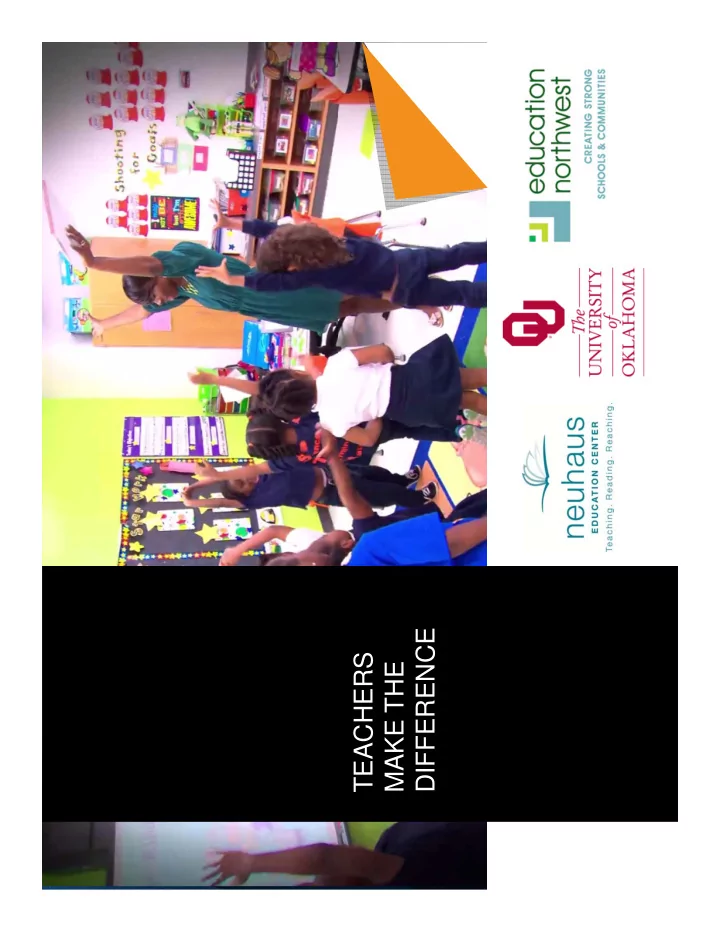

DIFFERENCE TEACHERS MAKE THE
ROLES Steve Underwood, Ed.D. Marybeth Flachbart, Ed.D. Education Northwest | Manager in Neuhaus Education Center, the Center for Strengthening President/CEO Education Systems mflachbart@neuhaus.org steve.underwood@educationnorthwest.org Regina Boulware-Gooden , Ph.D. Vanessa Grant, M.S. Neuhaus Education Center, Neuhaus Education, Center VP School Improvement & Coaching Coordinator Research sgrant@neuhaus.org rgooden@neuhaus.org
3 The William Stamps Farish Fund
CONTEXT OF THE PROJECT
QUESTION: DOES A SYSTEMIC AND STRUCTURED APPROACH TO LITERACY INSTRUCTION IMPROVE OUTCOMES FOR PRE-K STUDENTS LIVING IN POVERTY?
TEACHERS MAKE THE DIFFERENCE http://createmediaservices.com/clients/mal osky/neuhaus/PreK/
SYSTEMS THINKING A systemic approach to large-scale educational improvement accounts for all the parts and all of the people, and intentionally integrates them so that they move forward collectively and coherently. It ensures that efforts are not fragmented, for when they are fragmented, they do not produce Image: Shannon & Bylsma (2007). The nine characteristics of high-performing adequate results. schools.
USING A THEORY OF CHANGE
10 THANK YOU TO OUR PARTNERS
OUTPUT 1: WORKSHOPS PLUS COACHING Training Skill Classroom Knowledge Components Implementation Application % of teachers who understand % of teachers who apply % of teachers who transfer concept concept concept into their repertoire Theory (e.g., presenter 10% 5% 0% explains the concept) Plus Demonstration 30% 20% 0% (e.g., presenter models the concept) Plus Practice (e.g., 60% 60% 5% participants practice the concept during the training) Plus Peer Coaching (e.g., participants receive 95% 95% 95% ongoing feedback about their practices of the concept in a real setting) Joyce, B., & Showers, B. (2002). Student achievement through staff development (3rd ed.). Alexandria, VA: Association for Supervision and Curriculum Development.
12 OUTPUT 2: RESOURCES AND TOOLS
OUTCOMES Student Knowledge Teacher Practice Teacher Knowledge Phoneme/ Phonemic Letter Recognition Grapheme Oral Language Awareness Knowledge 13
COMPONENTS OF PROFESSIONAL DEVELOPMENT AND EMBEDDED COACHING • Concepts of Print • Phonological Awareness • Letter Recognition • Oral Language 14
A SIMPLE VIEW OF READING reading comprehension goal of reading (RC) language decoding comprehension (D) (LC) RC = D x LC (Gough & Tunmer, 1986)
READING Decoding Comprehension F L 1. Oral language 1. Instant word recognition U E 2. Sound/symbol 2. World Knowledge N 3. Structural analysis 3. Strategic Thinking C 4. Context 4. Inference Making Y
CONCEPTS OF PRINT • Book knowledge - Title - Author - Front/end • How print works - How spoken words relate to printed words - Where words are found on the page - Where one word ends and another word begins
PHONOLOGICAL AWARENESS • Rhyming and Alliteration • Counting Words in Sentences • Counting and Blending Syllables • Identifying Sounds • Phoneme segmentation and blending
INSTANT LETTER RECOGNITION CHART 1 A B C D E F B F D C A E D F E C B A C A B E F D F C A B D E
ORAL LANGUAGE • Oral language – the words children can understand and can use when listening and speaking • Oral language comes from: - singing songs - telling nursery rhymes - reading and looking at books - playing word games - talking, talking, talking
INTRODUCTION TO COACHING LOGS • Coaching logs were developed for each component. • Coaches completed logs after each coaching session. • Data from logs was shared with coaches monthly. • Instruction was adjusted according to data. 21
OVERVIEW OF PROFESSIONAL DEVELOPMENT FOR TEACHERS AND COACHING • Pre-K teachers and coaches attended five days of professional development sessions, with a final day of collaboration with Kindergarten teachers. • Teachers were given a pre- and post- Literacy Knowledge Survey on first and last days of workshops. • Topics covered included Concepts of Print, Phonological Awareness, Letter Recognition, Oral Language, and Motivation to Read. 22
volume 3 volume 3
volumen cuatro volume 4
COACHING • Coaches were certified current and former teachers. • Role of the coach was to support, model, collaborate. • Received training for coaching through the University of Oklahoma and Neuhaus Education Center . 27
COACHING • Coaches met with teachers either weekly or monthly throughout the school year, using four techniques from the University of Oklahoma (Observation, Demonstration, Side-by-Side, and Shadow coaching. • Reviewed ELQA data and set goals with teachers to improve literacy instruction. 28
29 BEGINNING AND END OF YEAR RESULTS
30 GREATER THAN EXPECTED DIFFERENCES
CHANGES IN STUDENT AND TEACHER KNOWLEDGE • Teacher literacy knowledge increased significantly. • Teachers became more familiar with ELQA data analysis through coaching activities about using data to drive classroom instruction. • Teachers reported that external coaches helped them improve their instructional practices. 31
LESSONS LEARNED • Early intervention is important • Plan in advance for evaluation • Make data collection simple • You can make a difference! 32
QUESTIONS
Recommend
More recommend